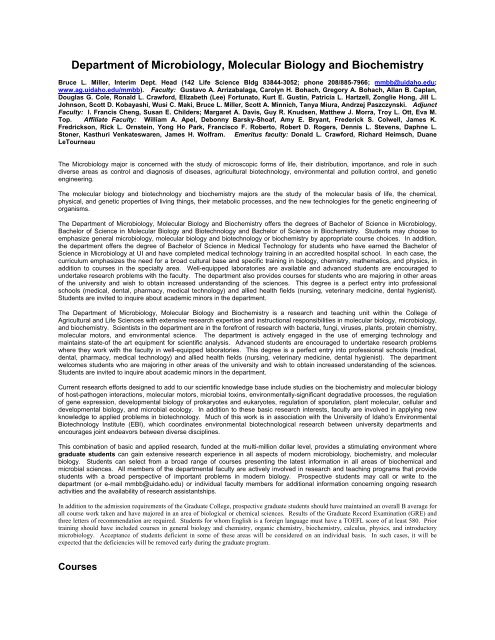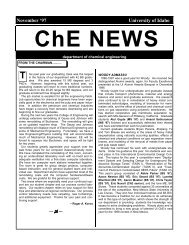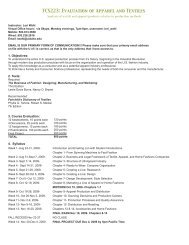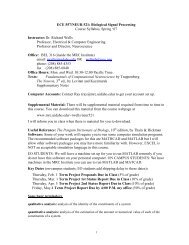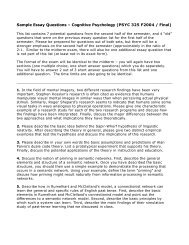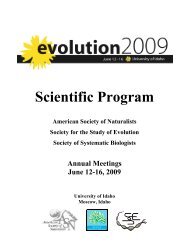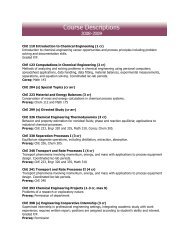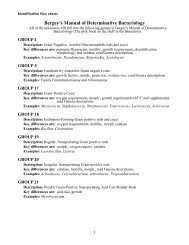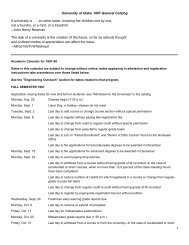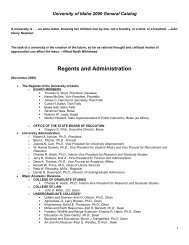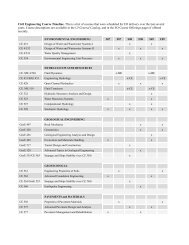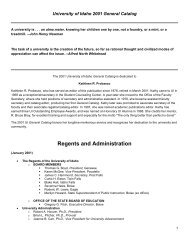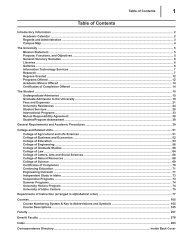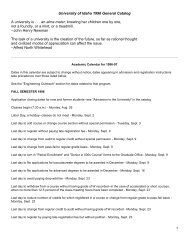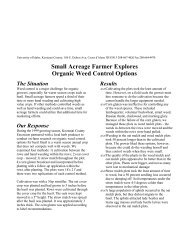Department of Microbiology, Molecular Biology and Biochemistry
Department of Microbiology, Molecular Biology and Biochemistry
Department of Microbiology, Molecular Biology and Biochemistry
Create successful ePaper yourself
Turn your PDF publications into a flip-book with our unique Google optimized e-Paper software.
<strong>Department</strong> <strong>of</strong> <strong>Microbiology</strong>, <strong>Molecular</strong> <strong>Biology</strong> <strong>and</strong> <strong>Biochemistry</strong><br />
Bruce L. Miller, Interim Dept. Head (142 Life Science Bldg 83844-3052; phone 208/885-7966; mmbb@uidaho.edu;<br />
www.ag.uidaho.edu/mmbb). Faculty: Gustavo A. Arrizabalaga, Carolyn H. Bohach, Gregory A. Bohach, Allan B. Caplan,<br />
Douglas G. Cole, Ronald L. Crawford, Elizabeth (Lee) Fortunato, Kurt E. Gustin, Patricia L. Hartzell, Zonglie Hong, Jill L.<br />
Johnson, Scott D. Kobayashi, Wusi C. Maki, Bruce L. Miller, Scott A. Minnich, Tanya Miura, Andrzej Paszczynski. Adjunct<br />
Faculty: I. Francis Cheng, Susan E. Childers; Margaret A. Davis, Guy R. Knudsen, Matthew J. Morra, Troy L. Ott, Eva M.<br />
Top. Affiliate Faculty: William A. Apel, Debonny Barsky-Shoaf, Amy E. Bryant, Frederick S. Colwell, James K.<br />
Fredrickson, Rick L. Ornstein, Yong Ho Park, Francisco F. Roberto, Robert D. Rogers, Dennis L. Stevens, Daphne L.<br />
Stoner, Kasthuri Venkateswaren, James H. Wolfram. Emeritus faculty: Donald L. Crawford, Richard Heimsch, Duane<br />
LeTourneau<br />
The <strong>Microbiology</strong> major is concerned with the study <strong>of</strong> microscopic forms <strong>of</strong> life, their distribution, importance, <strong>and</strong> role in such<br />
diverse areas as control <strong>and</strong> diagnosis <strong>of</strong> diseases, agricultural biotechnology, environmental <strong>and</strong> pollution control, <strong>and</strong> genetic<br />
engineering.<br />
The molecular biology <strong>and</strong> biotechnology <strong>and</strong> biochemistry majors are the study <strong>of</strong> the molecular basis <strong>of</strong> life, the chemical,<br />
physical, <strong>and</strong> genetic properties <strong>of</strong> living things, their metabolic processes, <strong>and</strong> the new technologies for the genetic engineering <strong>of</strong><br />
organisms.<br />
The <strong>Department</strong> <strong>of</strong> <strong>Microbiology</strong>, <strong>Molecular</strong> <strong>Biology</strong> <strong>and</strong> <strong>Biochemistry</strong> <strong>of</strong>fers the degrees <strong>of</strong> Bachelor <strong>of</strong> Science in <strong>Microbiology</strong>,<br />
Bachelor <strong>of</strong> Science in <strong>Molecular</strong> <strong>Biology</strong> <strong>and</strong> Biotechnology <strong>and</strong> Bachelor <strong>of</strong> Science in <strong>Biochemistry</strong>. Students may choose to<br />
emphasize general microbiology, molecular biology <strong>and</strong> biotechnology or biochemistry by appropriate course choices. In addition,<br />
the department <strong>of</strong>fers the degree <strong>of</strong> Bachelor <strong>of</strong> Science in Medical Technology for students who have earned the Bachelor <strong>of</strong><br />
Science in <strong>Microbiology</strong> at UI <strong>and</strong> have completed medical technology training in an accredited hospital school. In each case, the<br />
curriculum emphasizes the need for a broad cultural base <strong>and</strong> specific training in biology, chemistry, mathematics, <strong>and</strong> physics, in<br />
addition to courses in the specialty area. Well-equipped laboratories are available <strong>and</strong> advanced students are encouraged to<br />
undertake research problems with the faculty. The department also provides courses for students who are majoring in other areas<br />
<strong>of</strong> the university <strong>and</strong> wish to obtain increased underst<strong>and</strong>ing <strong>of</strong> the sciences. This degree is a perfect entry into pr<strong>of</strong>essional<br />
schools (medical, dental, pharmacy, medical technology) <strong>and</strong> allied health fields (nursing, veterinary medicine, dental hygienist).<br />
Students are invited to inquire about academic minors in the department.<br />
The <strong>Department</strong> <strong>of</strong> <strong>Microbiology</strong>, <strong>Molecular</strong> <strong>Biology</strong> <strong>and</strong> <strong>Biochemistry</strong> is a research <strong>and</strong> teaching unit within the College <strong>of</strong><br />
Agricultural <strong>and</strong> Life Sciences with extensive research expertise <strong>and</strong> instructional responsibilities in molecular biology, microbiology,<br />
<strong>and</strong> biochemistry. Scientists in the department are in the forefront <strong>of</strong> research with bacteria, fungi, viruses, plants, protein chemistry,<br />
molecular motors, <strong>and</strong> environmental science. The department is actively engaged in the use <strong>of</strong> emerging technology <strong>and</strong><br />
maintains state-<strong>of</strong> the art equipment for scientific analysis. Advanced students are encouraged to undertake research problems<br />
where they work with the faculty in well-equipped laboratories. This degree is a perfect entry into pr<strong>of</strong>essional schools (medical,<br />
dental, pharmacy, medical technology) <strong>and</strong> allied health fields (nursing, veterinary medicine, dental hygienist). The department<br />
welcomes students who are majoring in other areas <strong>of</strong> the university <strong>and</strong> wish to obtain increased underst<strong>and</strong>ing <strong>of</strong> the sciences.<br />
Students are invited to inquire about academic minors in the department.<br />
Current research efforts designed to add to our scientific knowledge base include studies on the biochemistry <strong>and</strong> molecular biology<br />
<strong>of</strong> host-pathogen interactions, molecular motors, microbial toxins, environmentally-significant degradative processes, the regulation<br />
<strong>of</strong> gene expression, developmental biology <strong>of</strong> prokaryotes <strong>and</strong> eukaryotes, regulation <strong>of</strong> sporulation, plant molecular, cellular <strong>and</strong><br />
developmental biology, <strong>and</strong> microbial ecology. In addition to these basic research interests, faculty are involved in applying new<br />
knowledge to applied problems in biotechnology. Much <strong>of</strong> this work is in association with the University <strong>of</strong> Idaho's Environmental<br />
Biotechnology Institute (EBI), which coordinates environmental biotechnological research between university departments <strong>and</strong><br />
encourages joint endeavors between diverse disciplines.<br />
This combination <strong>of</strong> basic <strong>and</strong> applied research, funded at the multi-million dollar level, provides a stimulating environment where<br />
graduate students can gain extensive research experience in all aspects <strong>of</strong> modern microbiology, biochemistry, <strong>and</strong> molecular<br />
biology. Students can select from a broad range <strong>of</strong> courses presenting the latest information in all areas <strong>of</strong> biochemical <strong>and</strong><br />
microbial sciences. All members <strong>of</strong> the departmental faculty are actively involved in research <strong>and</strong> teaching programs that provide<br />
students with a broad perspective <strong>of</strong> important problems in modern biology. Prospective students may call or write to the<br />
department (or e-mail mmbb@uidaho.edu) or individual faculty members for additional information concerning ongoing research<br />
activities <strong>and</strong> the availability <strong>of</strong> research assistantships.<br />
In addition to the admission requirements <strong>of</strong> the Graduate College, prospective graduate students should have maintained an overall B average for<br />
all course work taken <strong>and</strong> have majored in an area <strong>of</strong> biological or chemical sciences. Results <strong>of</strong> the Graduate Record Examination (GRE) <strong>and</strong><br />
three letters <strong>of</strong> recommendation are required. Students for whom English is a foreign language must have a TOEFL score <strong>of</strong> at least 580. Prior<br />
training should have included courses in general biology <strong>and</strong> chemistry, organic chemistry, biochemistry, calculus, physics, <strong>and</strong> introductory<br />
microbiology. Acceptance <strong>of</strong> students deficient in some <strong>of</strong> these areas will be considered on an individual basis. In such cases, it will be<br />
expected that the deficiencies will be removed early during the graduate program.<br />
Courses
See Part 6 for courses in <strong>Microbiology</strong>, <strong>Molecular</strong> <strong>Biology</strong> <strong>and</strong> <strong>Biochemistry</strong> (MMBB).<br />
Undergraduate Curricular Requirements<br />
BIOCHEMISTRY (B.S.Biochem.)<br />
Required course work includes the university requirements (see regulation J-3) <strong>and</strong>:<br />
Biol 115 Cells <strong>and</strong> the Evolution <strong>of</strong> Life (4 cr)<br />
Biol 210 Genetics or Gene 314 General Genetics (3-4 cr)<br />
Chem 111 Principles <strong>of</strong> Chemistry I (4 cr)<br />
Chem 112 Principles <strong>of</strong> Chemistry II (5 cr)<br />
Chem 253 Quantitative Analysis (5 cr)<br />
Chem 277 Organic Chemistry I (3 cr)<br />
Chem 278 Organic Chemistry I: Lab (1 cr)<br />
Chem 305 Physical Chemistry (3 cr)<br />
Chem 306 Physical Chemistry (3 cr)<br />
Chem 372 Organic Chemistry II (3 cr)<br />
Chem 374 Organic Chemistry II: Lab (1 cr)<br />
Math 170 Analytic Geometry <strong>and</strong> Calculus I (4 cr)<br />
Math 175 Analytic Geometry <strong>and</strong> Calculus II (4 cr)<br />
Math 275 Analytic Geometry <strong>and</strong> Calculus III (3 cr)<br />
MMBB 380 Introductory <strong>Biochemistry</strong> (4 cr)<br />
MMBB 382 Introductory <strong>Biochemistry</strong> Laboratory (2 cr)<br />
MMBB 400 Seminar (1cr)<br />
MMBB 442 Advanced <strong>Biochemistry</strong> II (3 cr)<br />
MMBB 476 Biophysical Chemistry (3 cr)<br />
Phys 211 Engineering Physics I (4 cr)<br />
Phys 212 Engineering Physics II (4 cr)<br />
Stat 251 Statistical Methods (3 cr)<br />
Select two <strong>of</strong> the following (5-6 cr):<br />
Biol 444 Genomics (3 cr)<br />
Chem 472 Rational Design <strong>of</strong> Pharmaceuticals (3 cr)<br />
Chem 473 Intermediate Organic Chemistry (3 cr)<br />
MMBB 409 Immunology (3 cr)<br />
MMBB 482 Protein Structure <strong>and</strong> Function (3 cr)<br />
MMBB 485 Prokaryotic <strong>Molecular</strong> <strong>Biology</strong> (3 cr)<br />
MMBB 486 Plant <strong>Biochemistry</strong> (3 cr)<br />
MMBB 487 Eukaryotic <strong>Molecular</strong> Genetics (3 cr)<br />
MMBB 488 Genetic Engineering (3 cr)<br />
MMBB 520 Instrumental Analysis (2 cr)<br />
Electives to total 128 credits for the degree<br />
MICROBIOLOGY (B.S.Microbiol.)<br />
Required course work includes the university requirements (see regulation J-3) <strong>and</strong>:<br />
Biol 210 Genetics or Gene 314 General Genetics (3-4 cr)<br />
Chem 111 Principles <strong>of</strong> Chemistry I (4 cr)<br />
Chem 112 Principles <strong>of</strong> Chemistry II (5 cr)<br />
Chem 253 Quantitative Analysis (5 cr)<br />
Chem 277 Organic Chemistry I (3 cr)<br />
Chem 278 Organic Chemistry I: Lab (1 cr)<br />
Chem 372 Organic Chemistry II (3 cr)<br />
Engl 317 Technical Writing or Engl 207 Persuasive Writing or Engl 208 Personal <strong>and</strong> Exploratory Writing or Engl 209 Inquiry-<br />
Based Writing (3 cr)<br />
Math 160 Survey <strong>of</strong> Calculus or Math 170 Analytic Geometry <strong>and</strong> Calculus I (4 cr)<br />
MMBB 154 Introductory <strong>Microbiology</strong> (3 cr)<br />
MMBB 250 General <strong>Microbiology</strong> (3 cr)<br />
MMBB 255 General <strong>Microbiology</strong> Laboratory (2 cr)<br />
MMBB 380 Introductory <strong>Biochemistry</strong> (4 cr)<br />
MMBB 400 Seminar (1 cr)<br />
MMBB 440 Advanced Laboratory Techniques or MMBB 401 Undergraduate Research (4 cr in one semester)<br />
Phys 111 General Physics I or Phys 211 Engineering Physics I (4 cr)<br />
Phys 112 General Physics II or Phys 212 Engineering Physics II (4 cr)<br />
Stat 251 Statistical Methods (3 cr)<br />
At least two <strong>of</strong> the following microbiology electives (6 cr):<br />
MMBB 409 Immunology (3 cr)
MMBB 412 Pathogenic <strong>Microbiology</strong> (3 cr)<br />
MMBB 432 Virology (3 cr)<br />
MMBB 460 Microbial Physiology (3 cr)<br />
MMBB 463 <strong>Molecular</strong> Parasitology (3 cr)<br />
MMBB 471 Advanced Pathogenesis: Host Pathogen Interactions (3 cr)<br />
At least two <strong>of</strong> the following molecular biology electives (5-6cr):<br />
MMBB 422 Cellular <strong>and</strong> <strong>Molecular</strong> Basis <strong>of</strong> Disease (3 cr)<br />
MMBB 450 <strong>Molecular</strong> Mechanisms in <strong>Microbiology</strong> (2 cr)<br />
MMBB 475 Cell <strong>Biology</strong> (3 cr)<br />
MMBB 485 Prokaryotic <strong>Molecular</strong> <strong>Biology</strong> (3 cr)<br />
MMBB 487 Eukaryotic <strong>Molecular</strong> Genetics (3 cr)<br />
MMBB 488 Genetic Engineering (3 cr)<br />
Science Electives (6 cr)<br />
Total 128 cr for the degree<br />
Note for double majors in <strong>Molecular</strong> <strong>Biology</strong> <strong>and</strong> <strong>Microbiology</strong>: Elective courses that count toward one degree cannot be counted as<br />
a science elective in the second degree.<br />
MEDICAL TECHNOLOGY (B.S.)<br />
The medical technologist performs critical laboratory tests <strong>and</strong> analytical procedures that aid physicians in the diagnosis <strong>and</strong><br />
treatment <strong>of</strong> disease. The curriculum is <strong>of</strong> interest to students desiring pr<strong>of</strong>essional careers in hospital <strong>and</strong> clinical laboratories,<br />
public health <strong>and</strong> research laboratories, <strong>and</strong> pharmaceutical laboratories. Students will have two options to obtain a BS degree in<br />
Medical Technology:<br />
1. Upon completion <strong>of</strong> the B.S. degree in microbiology (medical technology option), those students who successfully complete 32<br />
credits (MMBB 421) in a 12-month training course at an accredited hospital school <strong>of</strong> medical technology with a curriculum<br />
including clinical bacteriology, medical mycology, parasitology, clinical chemistry, toxicology, urinalysis, hematology,<br />
immunology-serology, immunohematology, <strong>and</strong> clinical correlations will be awarded the B.S. degree with major in medical<br />
technology.<br />
2. Students may also receive a BS in Medical Technology by completing the below coursework. With this option a student must<br />
successfully complete the below 96 credits <strong>of</strong> coursework in <strong>Microbiology</strong>, <strong>Molecular</strong> <strong>Biology</strong> <strong>and</strong> <strong>Biochemistry</strong> at the U <strong>of</strong> I <strong>and</strong><br />
32 credits <strong>of</strong> MMBB 421 in a 12-month training course at an accredited hospital school <strong>of</strong> medical technology with a curriculum<br />
including clinical bacteriology, medical mycology, parasitology, clinical chemistry, toxicology, urinalysis, hematology,<br />
immunology-serology, immunohematology, <strong>and</strong> clinical correlations.<br />
Required course work includes the university requirements (see regulation J-3) <strong>and</strong>:<br />
Biol 210 Genetics or Gene 314 General Genetics (3-4 cr)<br />
Chem 111 Principles <strong>of</strong> Chemistry I (4 cr)<br />
Chem 112 Principles <strong>of</strong> Chemistry II (5 cr)<br />
Chem 253 Quantitative Analysis (5 cr)<br />
Chem 277 Organic Chemistry I (3 cr)<br />
Chem 278 Organic Chemistry I: Lab (1 cr)<br />
Chem 372 Organic Chemistry II (3 cr)<br />
Math 160 Survey <strong>of</strong> Calculus or Math 170 Analytic Geometry <strong>and</strong> Calculus I (4 cr)<br />
MMBB 154 Introductory <strong>Microbiology</strong> (3 cr)<br />
MMBB 250 General <strong>Microbiology</strong> (3 cr)<br />
MMBB 255 General <strong>Microbiology</strong> Laboratory (2 cr)<br />
MMBB 380 Introductory <strong>Biochemistry</strong> (4 cr)<br />
MMBB 421 Hospital Internship (32 cr)<br />
MMBB 400 Seminar (1 cr)<br />
MMBB 440 Advanced Laboratory Techniques or MMBB 401 Undergraduate Research (4 cr in one semester)<br />
MMBB 409 Immunology (3 cr)<br />
Phys 111 General Physics I or Phys 211 Engineering Physics I (4 cr)<br />
Phys 112 General Physics II or Phys 212 Engineering Physics II (4 cr)<br />
Stat 251 Statistical Methods (3 cr)<br />
One <strong>of</strong> the following English Courses (3 cr):<br />
Engl 207 Persuasive Writing (3 cr)<br />
Engl 208 Personal <strong>and</strong> Exploratory Writing (3 cr)<br />
Engl 209 Inquiry-Based Writing (3 cr)<br />
Engl 317 Technical Writing (3 cr)<br />
One <strong>of</strong> the following MMBB electives (3 cr):<br />
MMBB 412 Pathogenic <strong>Microbiology</strong> (3 cr)<br />
MMBB 422 Cellular <strong>and</strong> <strong>Molecular</strong> Basis <strong>of</strong> Disease (3 cr)<br />
MMBB 432 Virology (3 cr)<br />
MMBB 463 <strong>Molecular</strong> Parasitology (3 cr)<br />
MMBB 471 Advanced Pathogenesis: Host Pathogen Interactions (3 cr)<br />
Electives to total 128 credits for the degree
MOLECULAR BIOLOGY AND BIOTECHNOLOGY (B.S.M.B.B.)<br />
Required course work includes the university requirements (see regulation J-3) <strong>and</strong>:<br />
Biol 115 Cells <strong>and</strong> the Evolution <strong>of</strong> Life (4 cr)<br />
Biol 210 Genetics or Gene 314 General Genetics (3-4 cr)<br />
Chem 111 Principles <strong>of</strong> Chemistry I (4 cr)<br />
Chem 112 Principles <strong>of</strong> Chemistry II (5 cr)<br />
Chem 253 Quantitative Analysis (5 cr)<br />
Chem 277 Organic Chemistry I (3 cr)<br />
Chem 278 Organic Chemistry I: Lab (1 cr)<br />
Chem 372 Organic Chemistry II (3 cr)<br />
Math 160 Survey <strong>of</strong> Calculus or Math 170 Analytic Geometry <strong>and</strong> Calculus I (4 cr)<br />
MMBB 250 General <strong>Microbiology</strong> (3 cr)<br />
MMBB 255 General <strong>Microbiology</strong> Lab (2 cr)<br />
MMBB 380 Introductory <strong>Biochemistry</strong> (4 cr)<br />
MMBB 382 Introductory <strong>Biochemistry</strong> Laboratory (2 cr)<br />
MMBB 400 Seminar (1cr)<br />
MMBB 442 Advanced <strong>Biochemistry</strong> II (3 cr)<br />
MMBB 485 Prokaryotic <strong>Molecular</strong> <strong>Biology</strong> or MMBB 487 Eukaryotic <strong>Molecular</strong> Genetics (3 cr)<br />
MMBB 488 Genetic Engineering (3 cr)<br />
Phys 111 General Physics I or Phys 211 Engineering Physics I (4 cr)<br />
Phys 112 General Physics II or Phys 212 Engineering Physics II (4 cr)<br />
Stat 251 Statistical Methods (3 cr)<br />
One <strong>of</strong> the following (4 cr):<br />
MMBB 401 Undergraduate Research (4 cr)<br />
MMBB 440 Advanced Laboratory Techniques (4 cr)<br />
MMBB 499 Directed Study (4 cr)<br />
Select two <strong>of</strong> the following (5-6 cr):<br />
Biol 444 Genomics (3 cr)<br />
MMBB 409 Immunology (3 cr)<br />
MMBB 412 Pathogenic <strong>Microbiology</strong> (3 cr)<br />
MMBB 432 Virology (3 cr)<br />
MMBB 475 Cell <strong>Biology</strong> (3 cr)<br />
MMBB 485 Prokaryotic <strong>Molecular</strong> <strong>Biology</strong> (3 cr)*<br />
MMBB 487 Eukaryotic <strong>Molecular</strong> Genetics (3 cr)*<br />
MMBB 520 Instrumental Analysis (2 cr)<br />
Electives to total 128 credits for the degree<br />
Note: Either MMBB 485 or 487 may be used as an elective if not taken above as a required course.<br />
Academic Minor Requirements<br />
BIOCHEMISTRY MINOR<br />
MMBB 380 Introductory <strong>Biochemistry</strong> (4 cr)<br />
MMBB 442 Advanced <strong>Biochemistry</strong> II (3 cr)<br />
Courses selected from the following (12 cr):<br />
Chem 302, 303 Principles <strong>of</strong> Physical Chemistry <strong>and</strong> Lab (or equiv) (4 cr)<br />
MMBB 382 Intro Biochem Lab or 484 Biochem Lab (2 cr)<br />
MMBB 400 Seminar (2 cr)<br />
MMBB 401 Undergrad Research (1-4 cr)<br />
MICROBIOLOGY MINOR<br />
MMBB 250 General <strong>Microbiology</strong> (3 cr)<br />
MMBB 255 General <strong>Microbiology</strong> Lab (2 cr)<br />
MMBB 380 Introductory <strong>Biochemistry</strong> (4 cr)<br />
Three courses selected from the following (8-10 cr):<br />
MMBB 409 Immunology (3 cr)<br />
MMBB 412 Pathogenic <strong>Microbiology</strong> (3 cr)<br />
MMBB 416 Food <strong>Microbiology</strong> (3 cr)<br />
MMBB 425 Microbial Ecology (3 cr)<br />
MMBB 440 Advanced Laboratory Techniques (4 cr)<br />
MMBB 450 <strong>Molecular</strong> Mechanisms in <strong>Microbiology</strong> (2 cr)<br />
MMBB 460 Microbial Physiology (3 cr)<br />
MMBB 485 Prokaryotic <strong>Molecular</strong> <strong>Biology</strong> (3 cr)
MMBB 487 Eukaryotic <strong>Molecular</strong> Genetics (3 cr)<br />
MMBB 488 Genetic Engineering (3 cr)<br />
MOLECULAR BIOLOGY AND BIOCHEMISTRY MINOR<br />
MMBB 380 Introductory <strong>Biochemistry</strong> (4 cr)<br />
MMBB 442 Advanced <strong>Biochemistry</strong> II (3 cr)<br />
MMBB 476 Biophysical Chemistry, Chem 302 Principles <strong>of</strong> Physical Chemistry, or Chem 305-306 Physical Chemistry (3 cr)<br />
Three courses from the following (8-10 cr):<br />
MMBB 382 Introductory <strong>Biochemistry</strong> Lab (2 cr)<br />
MMBB 460 Microbial Physiology (3 cr)<br />
MMBB 475 Cell <strong>Biology</strong> (3 cr)<br />
MMBB 482 Protein Structure <strong>and</strong> Function (3 cr)<br />
MMBB 487 Eukaryotic <strong>Molecular</strong> Genetics (3 cr)<br />
MMBB 488 Genetic Engineering (3 cr)<br />
Graduate Degree Programs<br />
C<strong>and</strong>idates must fulfill the requirements <strong>of</strong> the College <strong>of</strong> Graduate Studies <strong>and</strong> the <strong>Department</strong> <strong>of</strong> <strong>Microbiology</strong>, <strong>Molecular</strong> <strong>Biology</strong><br />
<strong>and</strong> <strong>Biochemistry</strong>. See the College <strong>of</strong> Graduate Studies section <strong>of</strong> Part 4 for the general requirements applicable to each degree.<br />
Seamless Bachelor <strong>of</strong> Science/Master <strong>of</strong> Science. Thesis <strong>and</strong> non-thesis options are <strong>of</strong>fered. The seamless B.S./M.S. degree<br />
program in microbiology, molecular biology <strong>and</strong> biochemistry enables qualified students to pursue the M.S. degree before<br />
completion <strong>of</strong> a B.S. degree in either microbiology, biochemistry or molecular biology/biotechnology. The classical B.S. degree from<br />
MMBB is typically completed by the fourth year <strong>of</strong> undergraduate training <strong>and</strong> will continue to be the route selected by most<br />
students. However, students accepted into the seamless program may work toward completion <strong>of</strong> both the B.S. <strong>and</strong> M.S.<br />
requirements during their fourth <strong>and</strong> fifth years or additional years if necessary. Successful students will receive both degrees upon<br />
completion <strong>of</strong> their studies. Provided that adequate academic <strong>and</strong> research progress is achieved, some students could complete<br />
the requirements for both the B.S. <strong>and</strong> M.S. in five years. Requirements for completion <strong>of</strong> the B.S. <strong>and</strong> M.S. degrees through the<br />
seamless program, <strong>and</strong> qualifications <strong>of</strong> graduates, are expected to be identical to those earning the degrees through the<br />
conventional path in which the two degrees are earned sequentially. Students interested in this program should discuss their<br />
options with their academic advisors. Identification <strong>of</strong> a graduate advisor plus formal application <strong>and</strong> acceptance to the MMBB<br />
graduate program <strong>and</strong> the College <strong>of</strong> Graduate Studies must be completed before the beginning <strong>of</strong> the fourth year. Once accepted,<br />
students must work toward completing the requirements for both degrees under the supervision <strong>of</strong> their graduate advisors <strong>and</strong><br />
graduate committees in accordance with departmental <strong>and</strong> university guidelines. In regard to <strong>of</strong>ficial st<strong>and</strong>ing within the university,<br />
students in the seamless program are classified as graduate students during their fourth <strong>and</strong> fifth years.<br />
Master <strong>of</strong> Science. Thesis <strong>and</strong> non-thesis options are <strong>of</strong>fered. The M.S. degree may be earned in microbiology, molecular biology<br />
<strong>and</strong> biochemistry. An incoming student arranges a formal graduate program <strong>of</strong> at least 30 semester hours in consultation with his or<br />
her major pr<strong>of</strong>essor <strong>and</strong> graduate committee. Students must take MMBB 589 during the fall <strong>and</strong> spring <strong>of</strong> the first year <strong>and</strong> take<br />
MMBB 511 for 1 credit every year. The student is also expected to include MMBB 501 (seminar) each semester. One semester <strong>of</strong><br />
teaching is required <strong>and</strong> is obtained through participation in the department's teaching programs. Students are required to pass the<br />
core courses MMBB 541, 542, <strong>and</strong> either 585 or 587. The final exam for MMBB 589 serves as the qualifying exam <strong>and</strong> is given in<br />
May <strong>of</strong> the first year. A master's c<strong>and</strong>idate prepares a written thesis documenting completion <strong>of</strong> a laboratory research program. The<br />
thesis must be approved by the student's major pr<strong>of</strong>essor <strong>and</strong> supervisory committee <strong>and</strong> be defended during an oral examination.<br />
Publication <strong>of</strong> data from the thesis in the peer-reviewed literature is expected.<br />
Doctor <strong>of</strong> Philosophy. The Ph.D. degree may be earned in microbiology, molecular biology <strong>and</strong> biochemistry. A doctoral student<br />
develops a graduate program <strong>of</strong> at least 78 semester hours in consultation with his or her major pr<strong>of</strong>essor <strong>and</strong> graduate committee.<br />
Students must take MMBB 589 during the fall <strong>and</strong> spring <strong>of</strong> the first year. The final exam for MMBB 589 serves as the qualifying<br />
exam <strong>and</strong> is given in May <strong>of</strong> the first year. Defense <strong>of</strong> a formal research proposal is required during the second year as part <strong>of</strong> the<br />
preliminary exam. The student is also expected to take MMBB 511 every year <strong>and</strong> enroll in 501 (seminar) each semester, with<br />
active participation in the form <strong>of</strong> one or more seminar presentations during the course <strong>of</strong> his or her graduate career. Students are<br />
required to pass the core courses MMBB 541, 542, <strong>and</strong> either 585 or 587. Two semesters <strong>of</strong> participation in the department's<br />
teaching programs are required. A preliminary examination is required in year two prior to admission to final c<strong>and</strong>idacy for the<br />
degree. All c<strong>and</strong>idates prepare a formal dissertation reflecting original thought <strong>and</strong> independent laboratory investigation <strong>and</strong> defend<br />
it during an oral presentation as a final step toward their degree. Publication <strong>of</strong> data from the dissertation in the peer-reviewed,<br />
scientific literature is expected.


